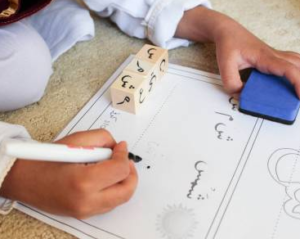First Ten Days of Zul Hijjah – Part 2 – Hajj,Fasting,Tasbeeh
![]()
1. Perform Hajj (Pilgrimage)
Hajj – one of the five pillars of Islam, which begins on 8th Dhul Hijjah is one of the best deeds that one can do during these ten days. Muslims from all over the globe assemble in Makkah Mukarramah during this five special days for the unique ibaadat of Hajj. Hajj is obligatory on every adult Muslim who has the means to go to Makkah Mukarramah during the Hajj season, whether on foot or by any other means. Females require a suitable willing Mahram to accompany them for the Hajj to become obligatory upon them.
Abu Hurayrah (Radiallahu Anhu) reported that Rasulullah Sallallahu Alayhi Wasallam said: “The performance of Umrah is expiation for the sins committed between it and the previous ones. And the reward for Hajj Mabrur (pilgrimage accepted by Allah) is nothing but Paradise.” (Bukhari)
However, if you can’t make it this year, make the intention during these blessed 10 days to go next year.
For those of us who were not invited to His House this year, there are still many more ways to earn the pleasure of Allah.
2. Fast all nine days and especially on the ‘Day of Arafah’ – One nights worship equal to that of Lailatul Qadr
Muslims are urged to fast any or all of the first 10 days Dhul Hijjah. Each day in these 10 days, Allah rewards the Muslim who fasts as if they had fasted a whole year. But those who fast on the ninth day (the Day of Arafah) will have their reward doubled: fasting that day will bring a reward as if the Muslim fasted two years.
Rasulullah Sallallahu Alayhi Wasallam said, “One fast during these days is equal to the fasting of one complete year, and the worship of one night during this period is equal to the worship of Lailatul-Qadr” Tirmidhi Shareef
Rasulullah Sallallahu Alayhi Wasallam said: “Anyone who fasts for one day for Allah’s pleasure, Allah will keep his face away from the (Hell) fire for (a distance covered by a journey of) seventy years.” Bukhari, Muslim Shareefain
Rasulullah Sallallahu Alayhi Wasallam said regarding fasting on the day of ‘Arafah: “Be content with the fact that Allah will expiate for you your sins for the year before (the day of ‘Arafah) and the year after (the day of ‘Arafah).” Muslim Shareef
The Fast of The Day of ‘Arafah
Those not performing Hajj should fast on this day according to their own calendar. It sometimes occurs that the date of 9th Zul Hijjah falls on different days in different countries according to the sighting of the moon. Muslims of each country should observe “Youmul ‘Arafah” according to the lunar dates of their own country.
However, whoever is at ‘Arafah as a pilgrim then fasting is not expected of him, as Rasulullah Sallallahu Alayhi Wasallam, stopped at ‘Arafah to eat.
3. Dhikr and Takbeer
Allah Ta’aala says: “That they might witness things that are of benefit to them (i.e., reward of Hajj in the Hereafter, and also some worldly gain from trade, etc.), and mention the name of Allah on appointed days, over the beast of cattle that He has provided for them (for sacrifice)…” [al-Hajj 22:28]
Rasulullah Sallallahu Alayhi Wasallam said: “There are no days on which good deeds are greater or more beloved to Allah than on these ten days, so recite much Tahleel (saying Laa ilaaha ill-Allah), Takbeer (saying Allahu Akbar) and Tahmeed (saying Alhamdu Lillaah).” (Ahmad)
It is Sunnah to say Takbeer (“Allahu akbar”), Tahmeed (“Al-hamdu Lillaah”), Tahleel (“La ilaha ill-Allah”) and Tasbeeh (“Subhaan Allah”) during the first ten days of Dhul-Hijjah. The idea behind reminding the people to recite Takbeer is that each one should recite it individually, not in unison, as there is no basis in Sharee’ah for doing this.
Imam Bukhari Rahmatullahi Alayhi said: “Ibn ‘Umar and Abu Hurayrah, Radiallahu Anhum, used to go out to the markets in the ten days saying the takbeer causing the people to follow them in this action.”
He also said: “‘Umar ibn Al-Khattab Radiallahu Anhu used to say the takbeer on his mimbar in Mina, whereupon the people of the Masjid hearing ‘Umar Radiallahu Anhu, would start to say the takbeer as would the people in the markets until the whole of Mina was locked in glorifying Allah.”
Ibn ‘Umar Radiallahu Anhu used to say the takbeer in Mina during these ten days and after prayers, whilst on his bed, in his tent, in his gathering and whilst walking. What is recommended is to say the takbeer aloud due to the fact that ‘Umar ibn Al-Khattab, his son and Abu Hurayrah Radiallahu Anhum used to do likewise.
The Takbeer may include the words “Allahu akbar, Allahu akbar, la ilaaha ill-Allah; wa Allahu akbar wa Lillaahil- hamd (Allah is Most Great, Allah is Most Great, there is no deity worthy of worship but Allah; Allah is Most Great and to Allah be praise),” as well as other phrases.
There are a number of ways of making takbeer that have been narrated by the companions and their followers and from these ways is the following:
Allahu akbar, Allahu akbar, Allahu akbar kabirun.
Allahu akbar, Allahu akbar, la ilaha illallahu, wallahu akbar, Allahu akbar, wa lillahil hamd.
Allahu akbar, Allahu Akbar, Allahu akbar, la ilaha illallahu, wallahu akbar, Allahu akbar wa lillahil hamd.
Takbeer-ut-Tashreeq after every Fard Salaah
As from the Fajr of the 9th Zul Hijjah upto Asr prayer of the 13th, it is obligatory on each Muslim to recite the Takbeer of Tashreeq in the following words:
Allahu akbar, Allahu akbar, la ilaha illallahu, wallahu akbar, Allahu akbar, wa lillahil hamd.
Allah is great. Allah is great. There is no god but Allah and Allah is great. Allah is great and to Allah belongs all praise.
According to authentic Islamic sources, it is obligatory on each Muslim to recite this Takbeer after every obligatory (Fard) salaah. For women also it is commendable, not obligatory. Whether you are performing salaah with Jama’ah (collectively) or on your own (individually) makes no difference, it must be recited. Male Muslims should recite it in a loud voice, while females should recite it in a low voice.
(To be continued in shaa Allah)



